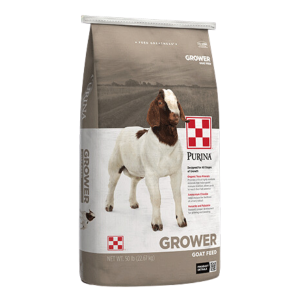Purina Goat Grower 16 Plus Up DQ.0015
Complete feed for the growth and development of goats
Purina Goat Grower 16 Plus Up DQ.0015 is a pelleted complete feed formulated for the optimum growth and development of goats. Whether you raise meat goats or dairy goats, Purina Goat Grower 16 Plus Up DQ.0015 feed is designed to meet their exacting needs.
Purina products deliver the nutrition and performance you expect. Try Purina® Goat Grower 16 Plus Up DQ.0015 feed and see the difference it can make in your goats’ overall growth and health.
Stop into Foreman’s General Store located in Colleyville, Texas for your goat feed and supplies. A member of our helpful staff will gladly help you find the best feeds for your animals. Have questions? Be sure to contact us. If you need more information about Purina feeds, check out their website.
Features
Nutritionally Complete
Helps provide the proper balance of high-quality proteins, vitamins, minerals and other nutrients
Built in roughage source helps minimize clean-up from wasted or uneaten forage
Palatable, Premium Ingredients
Consistent quality helps assure high palatability and supports performance
Pelleted
Helps reduce sorting, easy to handle
Organic Trace Minerals
Provides critical highly-available minerals that help support immune function and allows goats to reach their full potential
Urinary Acidifiers including Ammonium Chloride and/or Ammonium Sulfate
Helps reduce the likelihood of urinary calculi
Yeast Culture
Helps maintain rumen health and digestive efficiency
Options
Non-medicated option available (depending on plant)
Ingredients
Wheat Middlings, Wheat Red Dog, Ground Soybean Hulls, Corn Distillers Dried Grains with Solubles, Cane Molasses, Calcium Carbonate, Dehydrated Alfalfa Meal, Dehulled Soybean Meal, Ground Corn, Ammonium Chloride, Salt, Yeast Culture, Colored with Iron Oxide, Vitamin A Supplement, Zinc
Amino Acid Complex, Manganese Amino Acid Complex, Copper Amino Acid Complex, Vitamin D3 Supplement, Cobalt Glucoheptonate, Vitamin E Supplement, Zinc Oxide, Cobalt Carbonate, Manganese Sulfate, Ethylenediamine Dihydroiodide, Zinc Sulfate, Sodium Selenite, Basic Copper Chloride.
*Ingredients differ by manufacturing plant.
Guaranteed Analysis
NUTRIENT LEVEL
Crude Protein, (Min) .....................................................16.00%
This includes not more than 1.5% equivalent crude protein from non-protein nitrogen
Crude Fat, (min)..............................................................2.00%
Crude Fiber, (max) ........................................................16.00%
Acid Detergent Fiber (ADF) (max).................................20.00%
Calcium (Ca), (min) .........................................................1.00%
Calcium (Ca), (max) ........................................................1.50%
Phosphorus (P), (min) .....................................................0.50%
Salt (NaCl), (min)............................................................ 0.50%
Salt (NaCl), (max)........................................................... 1.00%
Sodium (Na), (max).........................................................0.65%
Copper (Cu), (min) ...................................................20.00 ppm
Copper (Cu), (max) ..................................................27.60 ppm
Selenium (Se), (min).................................................. 0.30 ppm
Vitamin A, (min)........................................................5,000 IU/lb
Feeding
Feed at a rate of 1.67 lbs to goats/kid weighing 50 lbs to provide 22.7 mg
decoquinate per 100 lb of bodyweight (0.5 mg/kg) per day. Feed at least 28 days during period of exposure to coccidiosis or when it is likely to be a hazard.
Warning: Do not feed to goats producing milk for food.
Important:
1. Start kids on colostrum milk from birth to 3 days of age; feed Land O’Lakes®
Doe’s Match® Kid Milk Replacer or Purina® Goat Kid Milk Replacer from 2 days until 4-8 weeks of age.
2. If kids have not been creep fed or they were purchased, then they should be placed on grass hay on a free-choice basis after arrival.
3. When making a ration change, allow 7 to 10 days for animals to adjust to the new ration.
4. Keep a constant supply of complete feed available. Do not let fine material accumulate in feeders.
5. Provide adequate bunk space for each animal. Bunks should be well-protected and well-managed to prevent feed from becoming wet or moldy.
6. Provide a source of fresh, clean water at all times.
7. Feed Purina® Goat Mineral free-choice.
8. Consult your veterinarian for the recommended health program for your local area.
This includes internal and external parasite control. In groups of goats there are certain animals that experience chronic bloat, or other digestive disturbances and consequently, are poor performers. In addition, excess feed consumption, severe weather changes resulting in erratic feed consumption and poorly managed feeding practices, can increase the incidence of bloat in all goats. If bloating occurs, the above management practices should be reviewed and your veterinarian consulted.
Caution:
Store in a dry, well-ventilated area protected from rodents and insects. Do not feed moldy or insect-infested feed to animals as it may cause illness, performance loss or death.
This product contains copper and should not be fed to sheep. Bentonite should not be used in decoquinate feeds.
USE ONLY AS DIRECTED.
Contact Us
Navigation
Quick Info
Colleyville, TX 76034
Fax: (817) 581-4335
email: info@foremansinc.com




